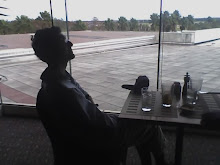ARLINGTON, Mass. -- Tuesday's snowfall has created a holiday atmosphere across the greater Boston area, and Christmas tunes abound on radio stations. The news headlines, however, focus on another religion: Islam.
On Sunday, Iraqi journalist Muntadar al-Zaidi
threw a pair of shoes at President Bush during Dubya's farewell visit to the nation. Shows of support for al-Zaidi took place in the Middle East, and fellow journalists explain his gesture as one of contempt for the president.
It's easy for some Westerners to paint al-Zaidi as representative of Islamic sentiment. Easy, but misleading. In a story depicting approval of al-Zaidi, the New York Times nevertheless
reported that "A number of Iraqis said they were dismayed by what Mr. Zaidi had done," that Lebanese "reactions varied by political affiliation," and that across the Middle East, people "deplored Mr. Zaidi’s act as a breach of respect or of traditional Arab hospitality toward guests, even if they shared the sentiment." Yet the headline read: "In Iraqi’s Shoe-Hurling Protest, Arabs Find a Hero. (It’s Not Bush.) "
This misrepresentation is only the continuation of a trend.
Consider another conflict: the Iranian Ayatollah Ruhollah Khomeini's 1988 fatwa against author Salman Rushdie for his portrayal of Islam in his novel "The Satanic Verses." Twenty years later, people still interpret the fatwa as emblematic of Muslims' reaction, when the actual situation shows more nuance. "When Saudi Arabia tried at the end of 1988 to get the novel banned in Muslim countries worldwide, few responded except those with large subcontinental populations, such as South Africa or Malaysia," spiked
reported. "Even in Iran the book was openly available and was reviewed in many newspapers."
Are some Muslims upset at the West? Yes. Is some of this anger justified? Rushdie merely wrote a book; al-Zaidi's anger has more concrete causes. (A Baghdad editor "said he recalled that in (the) last year his colleague told him that 'the criminal Bush' would pay two-fold for the crimes he committed against innocent Iraqis," the Times
reported.) Should we continue portraying these conflicts as pitting all Muslims against the West? No. There are some who see the nuance -- including our much-maligned president. "Mothers and fathers and children across the Islamic world, and all the world, share the same fears and aspirations," he
told the West Point graduates of 2002. "In poverty, they struggle. In tyranny, they suffer. And as we saw in Afghanistan, in liberation they celebrate."
Let's hope the present anger dies down. And let's hope that we in the West can see the nuances in thought across Iraq and the Islamic world.



